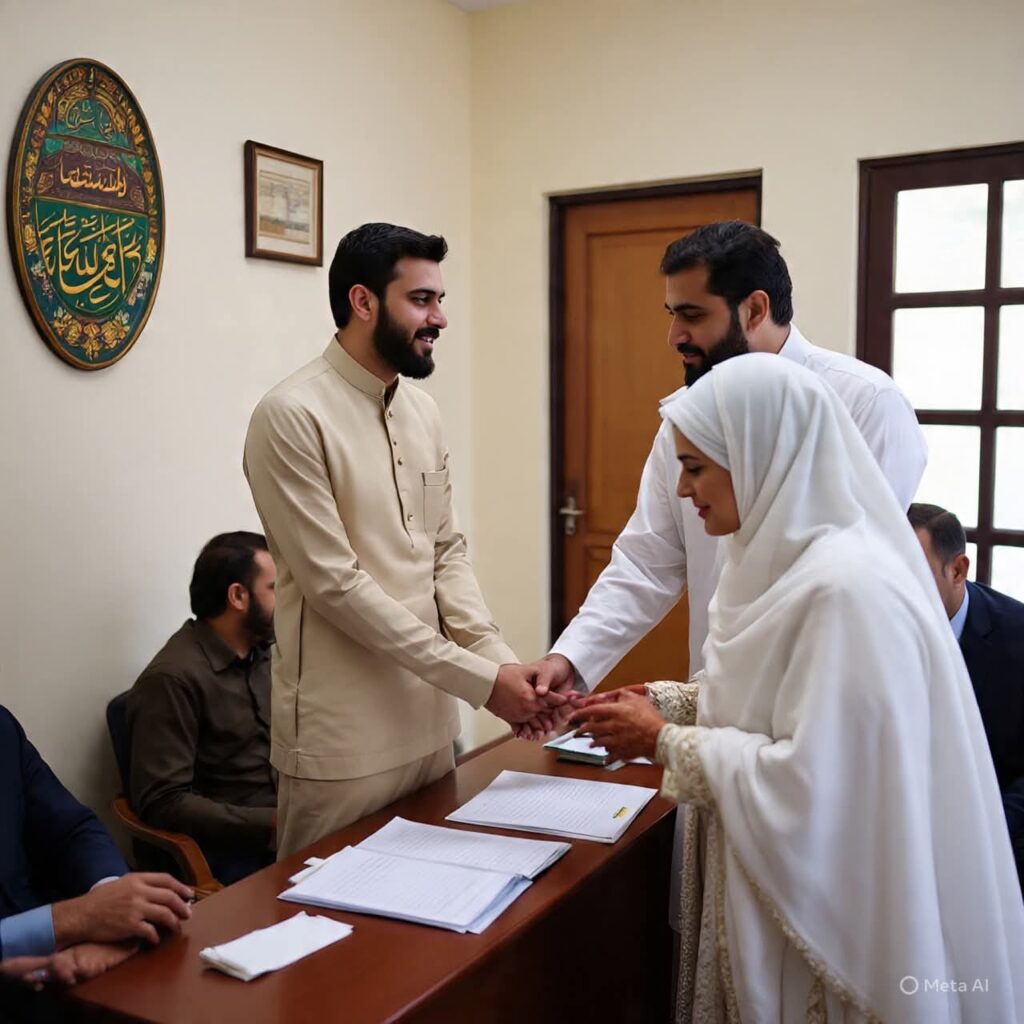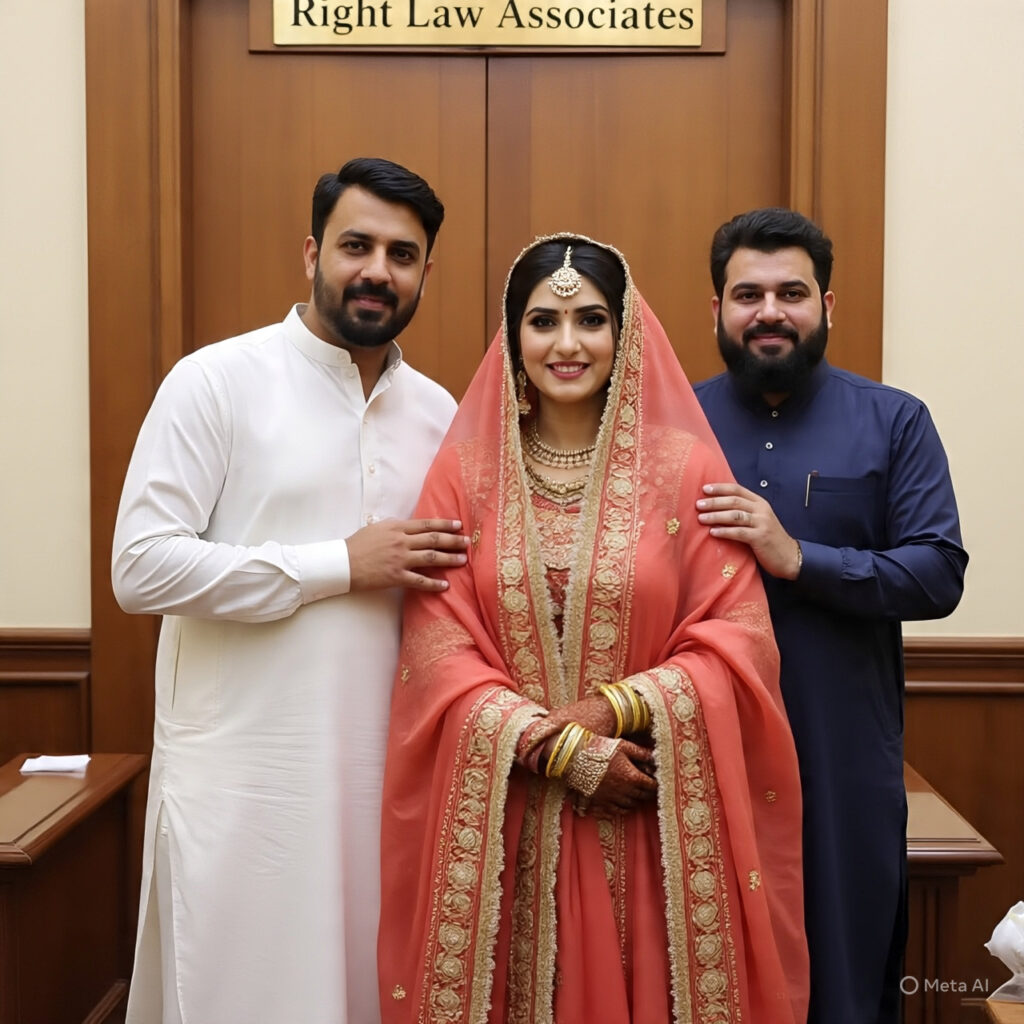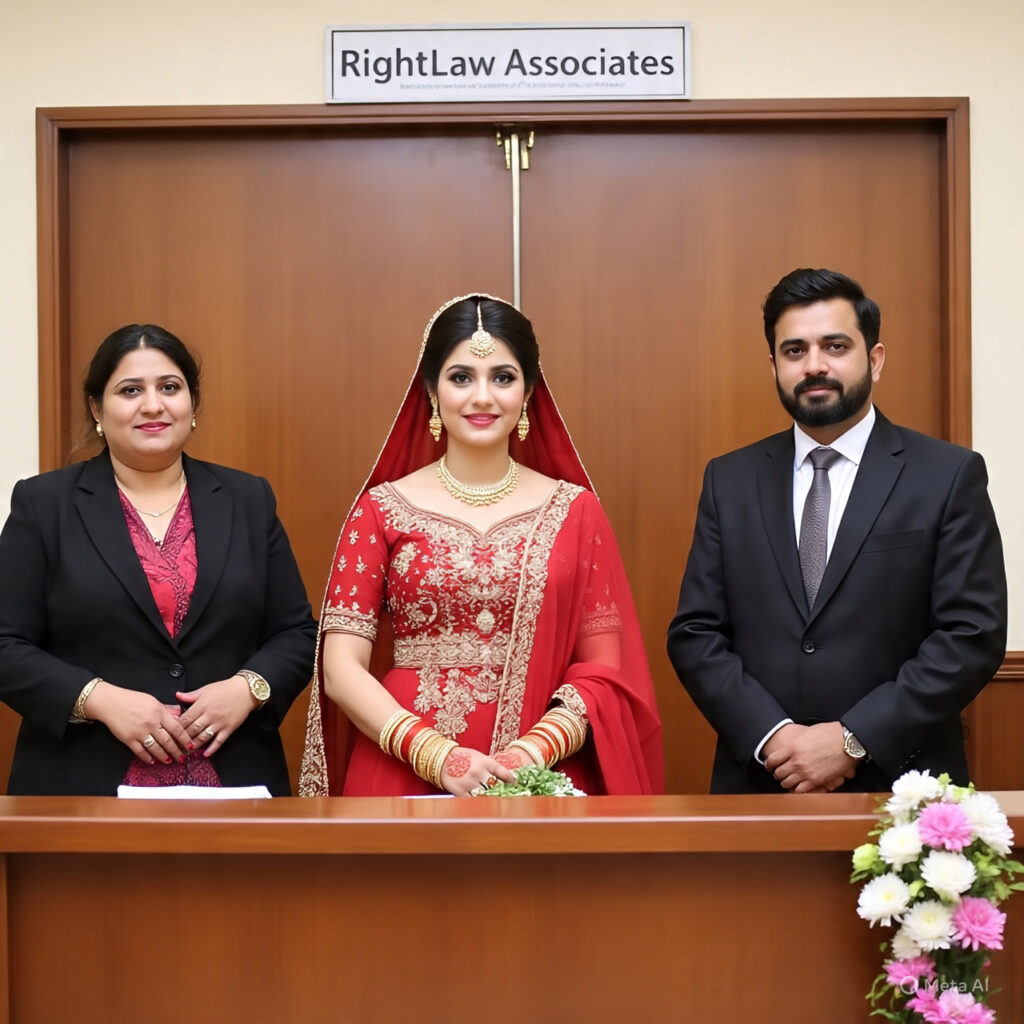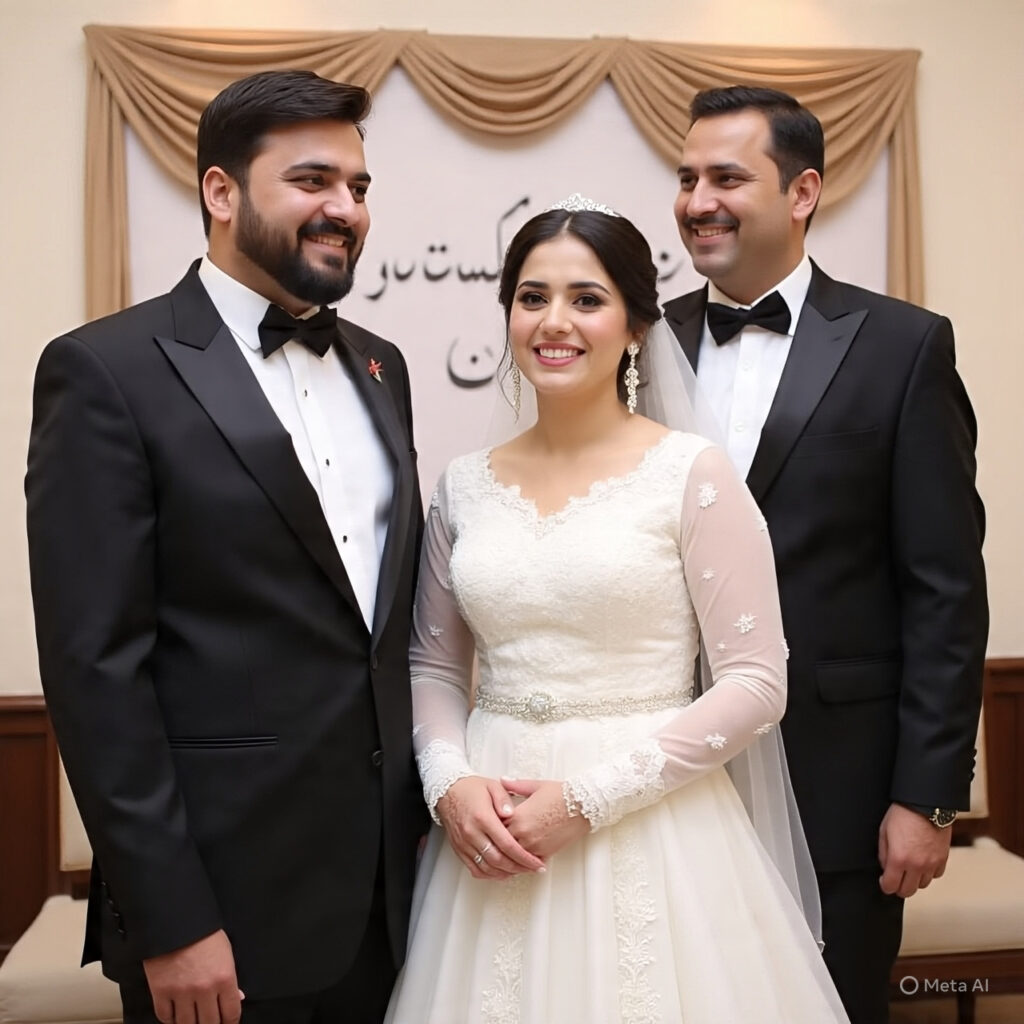Court Marriage Service in Islamabad, Karachi, Lahore, and Rawalpindi, Pakistan
What is a Court Marriage in Pakistan?
A court marriage is a marriage solemnized under the law of Pakistan and registered with the relevant marriage registrar. Unlike traditional ceremonies, court marriages are:
- Legally binding and recognized nationwide
- Confidential and straightforward, protecting your privacy
- Efficient, avoiding lengthy social or cultural procedures
Court marriages are ideal for couples seeking a straightforward legal process, official proof of marriage, or an alternative to traditional ceremonies due to personal circumstances.
Court Marriage Process in Islamabad
In Islamabad, court marriages are governed by Pakistani laws. Our team ensures you navigate the process efficiently and without delay.
Step 1: Initial Legal Consultation
Couples meet with our family law experts to understand:
- Legal requirements of a court marriage
- Required documents and affidavits
- Procedures to register the marriage with the registrar
Step 2: Document Preparation and Verification
Key documents include:
- CNICs of both parties
- Passport-sized photographs
- Affidavit of consent (if applicable)
- Proof of marital status, if previously married
We review and prepare all documents to ensure they meet legal requirements.
Step 3: Registrar Coordination
The registrar verifies the legality and registration of your marriage. We assist you with:
- Submit documents correctly
- Schedule appointments for registration
- Avoid errors that could delay approval.
Step 4: Marriage Registration
Once all documents are submitted, your marriage is officially recorded. You will receive a court-issued marriage certificate valid throughout Pakistan.


Court Marriage Services in Karachi
Karachi follows its own local rules for court marriages. We offer the following services to assist you:
- Legal consultation on Karachi-specific requirements
- Document preparation and verification
- Coordination with the Karachi registrar for smooth registration
- Post-registration assistance, including obtaining the official certificate
Court Marriage Services in Lahore
In Lahore, our legal team offers:
- In Lahore, our legal team provides marriage registration.
- Verification and attestation of CNICs, photographs, and affidavits
- Assistance with scheduling appointments with the Lahore registrar
- Full compliance with Lahore’s local laws to ensure legal validity
Court Marriage Services in Rawalpindi
If you are in Rawalpindi, we offer:
- Comprehensive court marriage guidance
- Document verification and affidavit preparation
- Liaison with the registrar to avoid delays
- Post-registration legal support to secure your marriage certificate
Why Choose Pakistan Marriage Lawyers?
- Expert Legal Support: Experienced lawyers in family law and court marriages
- Nationwide Coverage: Services across Islamabad, Karachi, Lahore, and Rawalpindi
- Efficient Documentation: Complete assistance with all paperwork and verification
- Personalized Guidance: Tailored solutions for each couple’s circumstances
- Legal Security: Ensuring your marriage is fully compliant with Pakistani law
Court Marriage in Pakistan – Frequently Asked Questions
Court marriage in Pakistan is a growingly popular choice for couples seeking a straightforward, legal, and hassle-free union. Unlike traditional weddings, court marriages center on the legal solemnization and registration under Pakistani law.
Many couples, including couples facing family opposition, overseas Pakistanis, and foreigners, often seek clear information on legal requirements, documentation, and international recognition of court marriages.
Below is a list of 20 frequently asked questions to help you understand the process, your rights, and legal safeguards. Court marriage in Pakistan is a legally recognized and internationally valid process that ensures both parties can marry with complete legal protection and confidentiality. Whether you are a resident, an overseas Pakistani, or a foreign national, the court marriage system provides a transparent, secure, and straightforward way to solemnize your relationship.
Understanding the requirements, documents, and legal formalities in these FAQs helps couples avoid confusion and ensure proper registration. For smooth processing, consult experienced court marriage lawyers in Pakistan for guidance through documentation, registration, and certification.


Court Marriage in Pakistan – Frequently Asked Questions (FAQs)
1. What is court marriage in Pakistan?
Court marriage in Pakistan is a legally recognized process in which two consenting adults marry through a formal legal procedure. It includes the Nikah (Islamic marriage contract) and official registration under Pakistani law.
2. Is court marriage legal and valid in Pakistan?
Yes. A court marriage is fully legal and valid under Pakistani law, provided all legal requirements are met, including age, consent, and proper documentation.
3. Is court marriage recognized internationally?
Yes. Once registered and certified, court marriages in Pakistan are legally valid internationally, particularly if they are translated or attested for use abroad.
4. Do both parties need to be physically present for a court marriage?
Yes, both the bride and groom must be physically present for the Nikah and registration process unless a special legal provision is made through a power of attorney or a proxy, which requires court approval.
5. What is the legal age for court marriage in Pakistan?
The legal minimum age for marriage in Pakistan is 18 years for both males and females.
6. Is parental or guardian consent required for a court marriage?
No. If both parties are adults (18 years or older), parental consent is not required by law. Free will and consent of the individuals are sufficient.
7. What documents are required for a court marriage?
- Valid CNIC or passport
- Two male witnesses with CNICs
- Six passport-sized photographs (bride/groom)
- Free Will Affidavit (especially from the bride)
- Divorce or death certificate (if previously married)
8. What is a Free Will Affidavit, and why is it needed?
A Free Will Affidavit is a legal document signed by the bride affirming that she is marrying voluntarily, without pressure or coercion. It ensures the marriage is consensual and legally protected.
9. Who can be witnesses to a court marriage?
Two adult male witnesses with valid CNICs are required. If you are unable to arrange witnesses, some law offices can assist with this process.
10. Can foreign nationals marry in Pakistan through a court marriage?
Yes, foreign nationals can legally marry in Pakistan, provided they present:
- Valid passport
- Visa with legal status
- No Objection Certificate (NOC) from their home country
At least one partner must have a Pakistani ID.
11. Can overseas Pakistanis get married in Pakistan?
Yes, overseas Pakistanis can marry in Pakistan through a court marriage. Additional documents, such as a valid Pakistani CNIC/NICOP and proof of foreign residency, may be required.
12. How long does the court marriage process take?
If all documents are in order, the entire process can be completed within a few hours or on the same day.
13. How much does a court marriage cost in Pakistan?
Court marriage fees generally range from PKR 20,000 to PKR 50,000, depending on the city, legal complexity, and additional services such as protection or documentation for foreign nationals.
14. Can a couple keep their court marriage private?
Yes. Confidentiality is a legal right. Reputable lawyers and legal offices ensure complete privacy throughout the process. The marriage is not published or announced publicly.
15. Is court marriage different from a traditional Nikah?
A traditional Nikah is often arranged through family involvement, whereas a court marriage is a legally formalized and registered Nikah, usually done independently. Both are valid under Islamic law.
16. Can a court marriage be challenged in court later?
If all legal formalities are fulfilled, the marriage cannot be invalidated without lawful grounds. The registration and documents serve as strong legal evidence of the union.
17. What legal protections are available after a court marriage?
After a court marriage, couples enjoy the same rights as traditionally married couples, including rights related to inheritance, property, maintenance, and protection from harassment or threats.
18. Can couples request legal protection if facing threats from family?
Yes. Legal protection is available, including:
- Police protection
- Court orders or stay orders
- FIRs against harassment or forced abduction
Your lawyer can guide you through these safeguards.
19. Do I need a lawyer for a court marriage in Pakistan?
While not mandatory, hiring a court marriage lawyer is highly recommended to ensure:
- Proper documentation
- Legal compliance
- Privacy and security
- Error-free registration
20. How can I start the court marriage process in Pakistan?
You can begin by contacting experienced court marriage lawyers who will:
- Guide you through requirements.
- Prepare all necessary documents.
- Arrange witnesses (if needed)
- Register your marriage officially.
At Islamabad Lawyers & Attorneys, we provide full legal support, documentation assistance, and complete confidentiality for couples considering court marriage.
Begin Your Court Marriage Today
Do not let legal procedures delay your marriage. At Islamabad Lawyers & Attorneys, we support you throughout the court marriage process in Islamabad, Karachi, Lahore, and Rawalpindi. From document preparation to registrar coordination, we ensure a smooth and fully legal process.
Contact us today to schedule a consultation and begin your court marriage with confidence.
